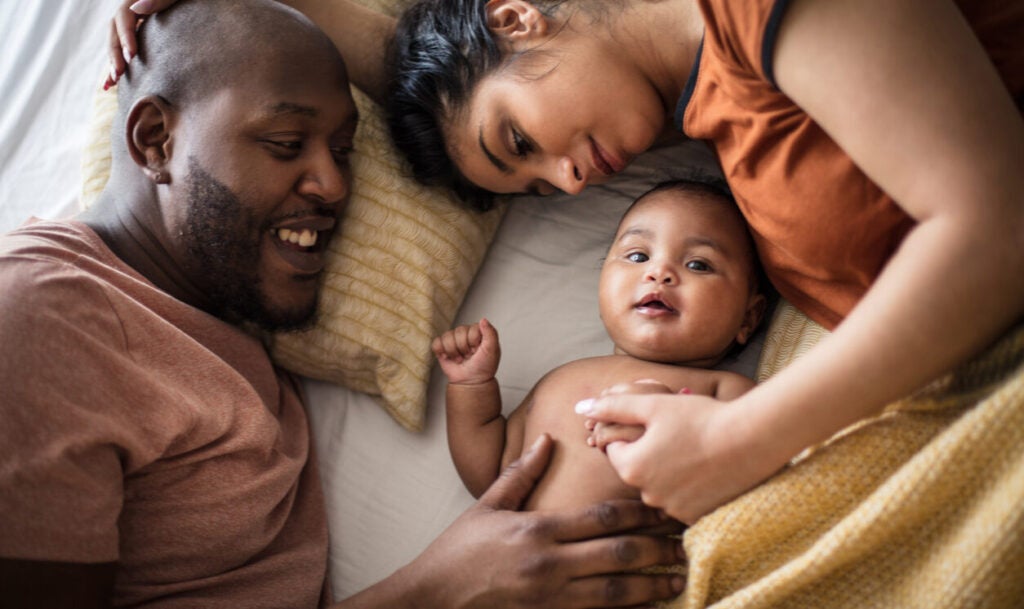Reflecting Forward by Claudia M. Gold, MD (Pediatrician, Early Relational Health Specialist), and David Willis, MD
Surgeon General Vivek Murthy, MD, has shown once again that he has his proverbial finger on the pulse of our nation’s health and well-being. In his latest advisory, titled “Parents Under Pressure,” he calls for a fundamental shift in how we value parents in order to ensure not only their well-being and supports to provide strong, positive, and nurturing relationships but also the health of our society as a whole. As pediatricians specializing in Early Relational Health, we appreciate Dr. Murthy’s call to “reorient our priorities [regarding parents] … to ensure the balance skews toward joy” of the parenting experience.
If we take a moment to reflect on the needs of the human newborn dependent on the care and nurturing they receive from their primary caregivers, the travesty of neglecting parents’ needs and well-being becomes crystal clear.
Babies come into the world announcing their arrival with a magnificent cry of, “I’m here!” The immediacy of that voice brings an urgent call to the adults to pay attention — to listen and learn as they enter into a nurturing relationship with this new person. The human newborn is uniquely helpless, relying completely on the adult caregiving environment for regulation of the immature nervous system that builds their health, learning capacities, and social presence in the world. Human evolution has required that 70 percent of brain growth occurs outside the womb and demonstrates its profound capacities to create complex social connections and communication with a community of caregivers. From the moment of birth, babies have the ability to open their eyes and turn their head to follow a familiar and loving voice, and even show some social imitative skills.
The human caregiver, provided they are held and supported in proportion to the essential nature of the task, knows what to do to care for their baby. And no caregiver is perfect in that skill. Decades of developmental research reveal that far from being smooth, this developing interactive process is messy and uncertain, with parents typically missing up to a whopping 70 percent of their infant’s cues. These missed cues are not only inevitable but also vital for promoting healthy relationships and development. In the repair and reconnection, baby and caregiver together develop a primary feeling of trust. Through this near imperceptible process, the sense of being loved and valued, together with a sense of belonging, takes root. We know these are crucial to Early Relational Health (ERH).
In an earlier advisory Dr. Murthy raised the alarm about the epidemic of loneliness in the United States. The experience of loneliness as a new parent has an exquisite painfulness that jeopardizes these tender new relationships and runs the risk of being transmitted to the next generation. Dr. Murthy outlines a series of social policy changes needed to safeguard against this dilemma. Nurturing connections and Early Relational Health are foundational to the next generation flourishing, depending on the well-being, safety networks, and social dignity afforded all parents.
The time has come to ensure that — right from the start — all parents have the trust and support they need and deserve to raise their children with a sense of connection, dignity, and belonging.
References
Gold, C. (forthcoming March 2025) Getting to know you: Lessons in early relational health from infants and caregivers. Teachers College Press.
Tronick, E, & Gold, C. M. (2020) The power of discord: Why the ups and downs of relationships are the secret to building intimacy, resilience, and trust. Little, Brown Spark.

Claudia M. Gold, MD, is a pediatrician and writer who practiced general pediatrics for over 20 years and now specializes in Early Relational Health. She has clinical experience in a broad variety of communities and speaks frequently to both lay and professional audiences.

David Willis, MD, FAAP, is a Professor of Pediatrics at Georgetown University’s Center for Child and Human Development (GUCCHD). He was previously a senior fellow at the Center for the Study of Social Policy, and the executive director of the Perigee Fund, promoting Early Relational Health. Prior to that, Dr. Willis served as director of the Division of Home Visiting and Early Childhood Services at the U.S. Health Resources and Services Administration (HRSA) Maternal and Child Health Bureau.
At its heart, Nurture Connection is an engaged, insightful community of parents, caregivers, researchers, medical professionals, philanthropists, early childhood systems leaders, and policymakers dedicated to ensuring every child has strong, nurturing relationships during their earliest, formative years.
Our “Reflecting Forward” series features guest articles and reflections by dedicated members of our national network, from across the country—who are advancing the early relational health field through practice, research, and parent leadership. These reflections pave paths forward for transforming early childhood systems and imagining new possibilities for children, families, and communities.
